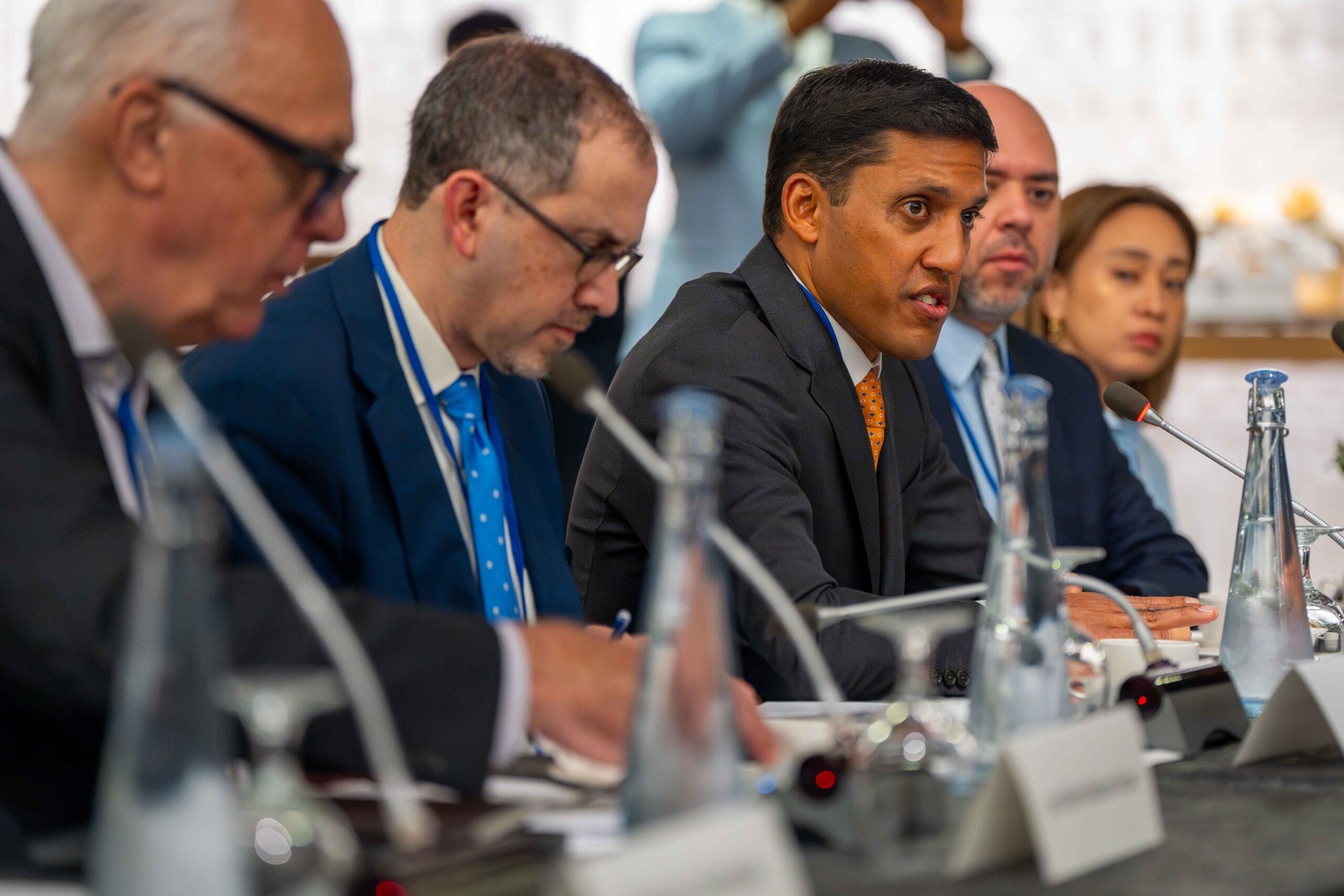On April 18th, during the 2024 Spring Meetings of the International Monetary Fund (IMF) and the Boards of Governors of the World Bank (WB), we convened a ministerial of governments, the United Nations, the African Union, and philanthropies to discuss how to build a stronger, more responsive global financial system to respond to escalating climate and development challenges.
With the Bridgetown Initiative, Barbados Prime Minister Mia Mottley energized a global conversation, continued by Ghanaian President Nana Akufo-Addo with the V20’s Accra to Marrakech Agenda, and Kenyan President William Ruto at the first African Climate Summit. In response to this expanding consensus, the World Bank articulated a strategy to achieve a bigger, better Bank. Other MDBs are moving forward towards this same goal, with the Asian Development Bank unlocking $100 billion of additional lending through CAF implementation and the African Development Bank (AfDB) and the Inter-American Development Bank (IDB) setting out innovative proposals for Special Drawing Rights (SDR) rechanneling. At COP28, we saw new initiatives emerge to mobilize and scale capital, particularly around energy transition, as well as a Leaders’ Declaration on a Global Climate Finance Framework. And now the Brazilian G20 Presidency has set out clear priorities to drive progress on global governance reform and to build better, bigger, and more effective multilateral development banks (MDBs). Also, in the G20, Brazil has set up two relevant Task Forces to push for meaningful results on mobilization: the Task Force for Global Mobilization Against Climate Change, and a Global Alliance against Hunger and Poverty. Looking forward, the UN has placed reform of the global financial system at the center of its agenda to revitalize multilateralism at this September’s Summit of the Future.
We came together to underscore the momentum and political will behind this effort. We represent a powerful coalition of governments, international organizations, and philanthropies committed to delivering meaningful change through the international financial architecture.
This statement captures areas of shared interest in our ministerial discussion:
MDB Reform
- To respond to the scale of the crises we are seeing in the developing world, MDBs must dramatically increase the financing available to low- and vulnerable middle-income countries, while improving operations and better assessing impact.
- This requires a stretching of existing financial resources, including by adjusting risk appetite and risk assessment models, as well as full implementation of the G20 recommendations on Capital Adequacy Frameworks (CAF).
- As part of its CAF implementation, we call upon the World Bank to expand its balance sheet by another $80 billion.
- At the same time, we urge all MDBs to take significant action to extend their balance sheets through callable capital and securitization.
- MDBs must innovate to mobilize more private capital, including through the use of hybrid capital and guarantees to reduce the disproportionate risk premiums that increase the cost of capital in emerging markets.
- MDBs need to work as a system better – in part, by streamlining and harmonizing their processes and by building a larger pipeline of viable projects rather than competing for a limited pool of existing projects.
- To create more space on MDB balance sheets, a different kind of dialogue between MDBs and credit rating agencies is necessary – one that ultimately evolves views on the risks they face and their unique features, including preferred creditor status and callable capital.
- Furthermore, MDBs boards need to regularly assess capitalization needs in order to keep the banks well-fit for the purpose of delivering impact at speed and scale and connected to development and climate challenges, while enhancing voice and representations of emerging markets and developing countries.
- On operational improvements, it is important for the system of MDBs to boost co-financing, harmonize standards and connect to national stakeholders to go faster.
- Effectively assessing development impact is critical for the system of MDBs to evolve, and get the best value out of the resources mobilized.
- As we near the mid-point of this decisive decade of climate action, countries must submit revised NDCs in 2025, ahead of COP30. It is vital that MDBs, working together as a system, support the development of country platforms and country-owned investment plans, including through technical assistance, coordination, pipeline development, financial structuring, and financing.
IDA
- To support the most vulnerable countries, we must see a robust IDA21 replenishment this year, with significant increases in contributions from new and existing donors so that it could reach at least $115 billion in total.
- At the same time, policy reforms should be implemented to support more efficient and effective operations, including quicker and less cumbersome access to finance.
Fiscal Space, Debt Burdens, and SDRs
- Acknowledging that there has been some progress, the Common Framework still falls woefully short of addressing borrower needs in a timely way. It must be implemented in full, with accelerated and reliable timeframes and increased transparency around the process for borrower countries.
- International financial institutions (including the IMF), governments, and the private sector must find creative solutions to reduce the debt burden borne by developing countries and free up fiscal space for critical investments in development, climate resilience, and energy transitions.
- They must also collaborate to advance debt swaps for nature, energy transition and health, provide direct grants and capacity building, and develop new instruments with longer maturities with reduced borrowing costs, guarantees, securitization and risk-sharing mechanisms.
- The IMF and World Bank must significantly revise the Debt Sustainability Analysis to take into account both natural capital and climate risks, and efforts to mitigate these.
- Given the urgent need for innovative ways to expand MDB lending, the plan to authorize hybrid capital – using rechanneled SDRs through the MDB system to multiply their impact – should be approved quickly and countries with substantial reserves should consider contributing SDRs to increase climate and development lending at the AfDB and IDB.

